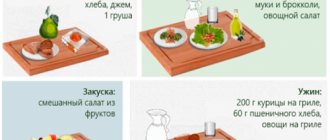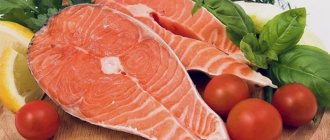Foods that are good for the intestines: nutrition for increased gas formation, IBS and constipation
This Personal Data Privacy Policy (hereinafter referred to as the Privacy Policy) applies to all information that this website, on which the text of this Privacy Policy is posted, can receive about the User, as well as any programs and products posted on it. 1. Definition of terms
1.1 The following terms are used in this Privacy Policy: 1.1.1. “Site Administration” - authorized employees to manage the site, acting on its behalf, who organize and (or) process personal data, and also determine the purposes of processing personal data, the composition of personal data to be processed, actions (operations) performed with personal data data.
1.1.2. “Personal data” - any information relating to a directly or indirectly identified or identifiable individual (subject of personal data).
1.1.3. “Processing of personal data” - any action (operation) or set of actions (operations) performed using automation tools or without the use of such means with personal data, including collection, recording, systematization, accumulation, storage, clarification (updating, changing), extraction, use, transfer (distribution, provision, access), depersonalization, blocking, deletion, destruction of personal data.
1.1.4. “Confidentiality of personal data” is a mandatory requirement for the Site Administration to comply with to prevent their intentional distribution without the consent of the subject of personal data or the presence of another legal basis.
1.1.5. “Site user (hereinafter referred to as User)” is a person who has access to the site via the Internet and uses this site for his own purposes.
1.1.6. “Cookies” are a small piece of data sent by a web server and stored on the user’s computer, which a web client or web browser sends to the web server each time in an HTTP request when an attempt is made to open a page on the corresponding site.
1.1.7. “IP address” is a unique network address of a node in a computer network built using the IP protocol.
2. General provisions
2.1. The User's use of the site constitutes agreement with this Privacy Policy and the terms of processing of the User's personal data.
2.2. In case of disagreement with the terms of the Privacy Policy, the User must stop using the site.
2.3.This Privacy Policy applies only to this website. The site administration does not control and is not responsible for third party sites that the User can access via links available on this site.
2.4. The site administration does not verify the accuracy of the personal data provided by the site user.
3. Subject of the privacy policy
3.1. This Privacy Policy establishes the obligations of the Site Administration for the intentional non-disclosure of personal data that the User provides upon various requests of the Site Administration (for example, when registering on the site, placing an order, subscribing to notifications, etc.).
3.2. Personal data permitted for processing under this Privacy Policy is provided by the User by filling out special forms on the Site and usually includes the following information:
3.2.1. Username;
3.2.2. User's contact phone number;
3.2.3. Email address (e-mail);
3.3. The site administration also makes efforts to protect Personal Data that is automatically transmitted during the process of visiting the site pages: IP address; information from cookies; information about the browser (or other program that accesses the site); access time; visited page addresses; referrer (address of the previous page), etc.
3.3.1. Disabling cookies may result in the inability to access the site.
3.3.2. The site collects statistics about the IP addresses of its visitors. This information is used to identify and solve technical problems and to monitor the correctness of operations.
3.4. Any other personal information not specified above (purchase history, browsers and operating systems used, etc.) is not subject to intentional disclosure, except for the cases provided for in paragraphs. 5.2. and 5.3. of this Privacy Policy.
4. Purposes of collecting the user’s personal information
4.1. The Site Administration may use the User’s personal data for the following purposes:
4.1.1. Establishing feedback with the User, including sending notifications, requests regarding the use of the site, provision of services, processing requests and applications from the User.
4.1.2. Confirmation of the accuracy and completeness of personal data provided by the User.
4.1.3. Notifications to the Site User about the status of the Order.
4.1.4. Providing the User with effective customer and technical support if problems arise with the use of the site.
5. Methods and terms for processing personal information
5.1. The processing of the User's personal data is carried out without a time limit, in any legal way, including in personal data information systems using automation tools or without the use of such tools.
5.2. The User agrees that the Site Administration has the right to transfer personal data to third parties, in particular, courier services, postal organizations, telecommunication operators, solely for the purpose of fulfilling the User’s requests.
5.3. The User's personal data may be transferred to authorized government bodies only on the grounds and in the manner established by current legislation.
6. Obligations of the parties
6.1. The user undertakes:
6.1.1. Provide correct and truthful information about personal data necessary to use the site.
6.1.2. Update or supplement the provided information about personal data if this information changes.
6.1.3. Take measures to protect access to your confidential data stored on the site.
6.2. The site administration undertakes:
6.2.1. Use the information received solely for the purposes specified in clause 4 of this Privacy Policy.
6.2.2. Do not disclose the User’s personal data, with the exception of paragraphs. 5.2. and 5.3. of this Privacy Policy.
6.2.3. Block personal data relating to the relevant User from the moment of application or request from the User or his legal representative or the authorized body for the protection of the rights of personal data subjects for the period of verification, in case of detection of unlawful actions.
7. Responsibility of the parties
7.1. The site administration is responsible for the intentional disclosure of the User's Personal Data in accordance with current legislation, except for the cases provided for in paragraphs. 5.2., 5.3. and 7.2. of this Privacy Policy.
7.2. In case of loss or disclosure of Personal Data, the Site Administration is not responsible if this confidential information:
7.2.1. Became public domain until it was lost or disclosed.
7.2.2. Was received from a third party before it was received by the Site Administration.
7.2.3. Was obtained by third parties through unauthorized access to site files.
7.2.4. Was disclosed with the consent of the User.
7.3. The user is responsible for the legality, correctness and truthfulness of the personal data provided in accordance with current legislation.
8. Dispute resolution
8.1. Before filing a claim in court regarding disputes arising from the relationship between the Site User and the Site Administration, it is mandatory to submit a claim (a written proposal for a voluntary settlement of the dispute).
8.2. The recipient of the claim, within 30 calendar days from the date of receipt of the claim, notifies the claimant in writing about the results of consideration of the claim.
8.3. If no agreement is reached, the dispute will be referred to a judicial authority in accordance with current legislation.
8.4. Current legislation applies to this Privacy Policy and the relationship between the User and the Site Administration.
9. Additional terms
9.1. The site administration has the right to make changes to this Privacy Policy without the consent of the User.
9.2. The new Privacy Policy comes into force from the moment it is posted on the Site, unless otherwise provided by the new edition of the Privacy Policy.
Main causes of bloating
12.10.2021
If you begin to notice frequent heaviness and bloating in your abdomen like a ball, emitting unpleasant odors, then such problems cannot be ignored. Flatulence manifests itself as an accumulation of harmful gases in the intestines due to deterioration of digestive function, in addition, there is a strong increase of the abdomen and a feeling of being filled with air from the inside.
Possible reasons
Bloating occurs even in physically healthy people, but most often it indicates other diseases of the body . Flatulence can manifest itself if you have any of the following diseases: chronic pancreatitis , irritable bowel syndrome , dysbiosis intestinal obstruction . In any case, flatulence is manifested by pain, distension of the abdomen and unpleasant-smelling gases . This reaction of the body is often a response to our lifestyle and diet.
If you often drink highly carbonated water, this causes the accumulation of various gases in the intestines , but they are not so dangerous because they are quickly absorbed into the walls or released naturally. Also, due to filling your stomach with large portions of food, you will experience heaviness and flatulence. Plus, some foods may not be fresh or may have a fermented effect, which will obviously cause you strong gases and even possibly a tingling sensation in your stomach .
If you are tormented by heartburn , and you use soda according to a home recipe, then this action can also cause an unpleasant increase in gas formation. Also, when consuming few combined foods, bloating may occur . Bloating can also occur with prolonged constipation , since getting rid of excess gases is almost impossible. Flatulence can also occur if you suddenly switch to a different diet (for example, go on a strict diet ). If you have allergic reactions to certain foods, do not be surprised by bloating , pain, nausea and diarrhea.
Corrective measures
Treatment of flatulence should always take into account the cause of its formation. In case of allergic reactions to foods, it is better to treat with the advice of a doctor , but it is still necessary to identify the allergenic ingredients and exclude them from the diet. If the cause of bloating is constipation , then simply take a laxative or special pharmaceutical suppositories. constipation itself is caused by poor diet, excessive stress on the body and excessive alcohol consumption.
To get rid of constipation faster, take activated charcoal at the rate of 1 tablet per 10 kg. weight. If constipation and bloating occur during pregnancy , then you should exclude beans, peas, cabbage, black bread, kvass or beer, as well as some fruits (grapes, plums) and flour products from your diet.
If bloating is temporary and not a sign of any disease, you can simply prevent further illnesses and problems from occurring. To do this, eat rice, chicken and turkey meat. Instead of milk, include yogurt and cheese in your diet.
Brew mint, chamomile and St. John's wort instead of tea. Also season your dishes with spices that reduce bloating and gas (for example, ginger, dill, cumin). Also, for prevention, do not forget to do exercises with squats and leg . Swimming and running will improve your well-being.
Dangerous products
When dealing with flatulence and bloating, there are many foods that are best not consumed so as not to aggravate your suffering. Reduce your intake of the following foods: coffee drinks, chocolate products, milk, tea, fatty foods, foods that are too cold or hot, honey, seeds, nuts, yeast, cabbage, beans, carbonated drinks, apples, raisins, alcohol, onions and radishes, as well as chewing gum.
To get rid of the unpleasant sensation of bloating in the stomach , you can resort to our advice, but it is best to look for the root cause with a doctor during a full examination of the digestive tract.
Published in Gastroentorology Premium Clinic
Diet for people with ileostomy
Why do you need to drink more fluid?
It is important to drink at least 10-12 glasses of fluid per day (unless your doctor advises otherwise). Absorption of fluid occurs in the colon. Since it is removed, the body loses a large amount of fluid excreted in stool through the stoma. Therefore, it is important to drink more to replace fluid loss. Otherwise, there will be a violation of the water-electrolyte balance and dehydration (dehydration) of the body.
Diarrhea is frequent, profuse, looser stool than usual, requiring frequent drainage of the colostomy bag. Diarrhea may be accompanied by fever and dizziness. Diarrhea can be caused by food and certain medications, such as antibiotics. During diarrhea, the body loses a large amount of fluid, salts and trace elements, which can lead to dehydration. If you have diarrhea, you need to drink plenty of fluids (at least a glass of water after each bowel movement). If you experience frequent attacks of diarrhea (more than 3 times in a row), consult your doctor.
Signs of dehydration (dehydration):
- Dry mouth
- Reduced frequency and volume of urine excreted
- Dark color of urine
- Dizziness
- Weakness
- Convulsions
To compensate for the loss of electrolytes (sodium and potassium), you must eat:
- Meat broths
- Tea
- Orange juice
- Bananas
- Apricots
- Potato
- Congee
- Crackers, salty cookies
- Products with a fixing effect:
- Potato
- Bakery products
- Rice
- Baked apples
- Pears
- Cheese
What foods to avoid and why?
Before surgery, large particles of food passed from the small intestine into the large intestine, where it was digested. For the first 6-8 weeks after surgery, try not to eat foods high in plant fibers that absorb liquid: oatmeal, citrus fruits, apples, peas and legumes. Such food is difficult to digest and can cause intestinal obstruction. Gradually increase your intake of plant fibers that are difficult to digest.
Foods that may cause intestinal obstruction:
- Carrots, cabbage, turnips, radishes, radishes and other root vegetables
- Nuts
- Celery
- Dried fruits
- Mushrooms
- Corn
- Some fruits with small seeds
- Orange or grapefruit zest
- Coconut
To avoid intestinal obstruction, eat slowly, chew food thoroughly, and drink liquid. During a food blockade, if you do not feel nauseous and stool comes out through the stoma under pressure in small portions, try to gradually increase your fluid intake. Drink hot tea or take a hot shower. Point the shower at your back to relax your abdominal muscles.
Important: If you feel nauseous and stool does not pass through the stoma, do not drink liquids, consult a doctor immediately
Wrong food combination
Sometimes products that normally do not form an accumulation of gases can give such an effect due to the incompatibility of some components with others. And then, in combination with each other, the products are gas-forming. The list of such combinations is as follows:
- eating flour and kefir at the same time;
- combination of eggs and fish in one dish;
- consumption of fresh fruits and vegetables with thermally processed ones;
- combination of dairy and fermented milk products.
Knowing what foods cause gas if consumed incorrectly, you can build your diet so that similar foods are not encountered at one meal. This will help a person normalize the functioning of his body.
Eating in public places
If your body has already adapted to a stoma, you can try eating out. It is important to eat regularly, as irregular eating leads to increased gas formation and diarrhea.
Once you figure out what kind of food suits you best, you can try going to a cafe or restaurant. It is better to prepare for your first visit to a public institution in order to feel comfortable. Start in a familiar place and try a simple dish.
When choosing dishes, you shouldn't be too careful, just be smart about it. Eat what you want, but don't forget that fatty foods and sauces can lead to problems. If you are afraid to eat certain foods, try them at home first to see how your body reacts to them, and then gradually introduce them into your diet. If you've drank a little alcohol before, you can try again, just start with a smaller dose than usual. This will help your body get used to it.











